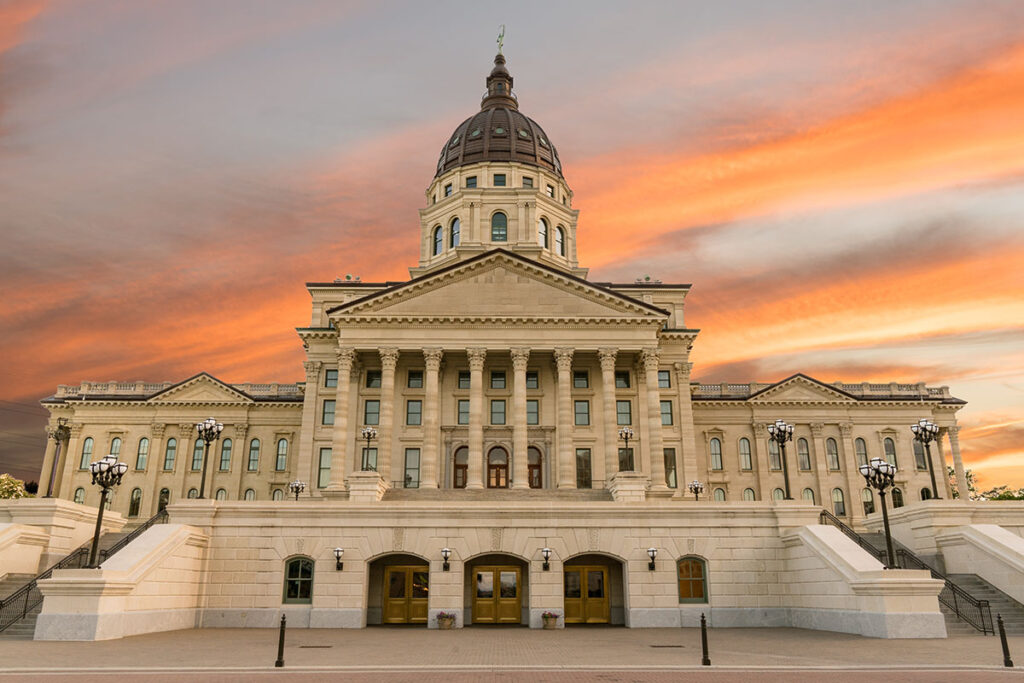Early this month, Governor Kelly testified to Congress, asking for federal bailouts of Kansas’ billion-dollar budget shortfall. However, bailing out Kansas’s budget shortfall cements poor fiscal management, puts Kansans at financial risk, and hastens a federal fiscal disaster.
According to the Kansas Legislative Research Department, Kansas went from an ending balance of $1.1 billion in June 2019 to $89.1 million a year later (Kansas’ fiscal years run from July 1 to June 30). While some blame stems from the COVID economic shock, much of that decline began before the COVID pandemic because Kansas has a spending problem, not a revenue problem. By June 2020, total state revenues fell 7.4% from the prior year, in part, due to COVID responses. However, state expenditures rose by 11.5% over the same time. The divergence in revenues and spending left Kansas with an ending balance of $89.1 million. By the end of July 2023, the state will need to find an extra $2.1 billion to close its shortfall gap and honor state law to have an ending balance equal to 7.5% of state spending. See the profile at the end of this post.
Federal bailouts of the magnitude create what economists call a “moral hazard.” Think of it as acting under a false sense of security, where you take more risky actions because you don’t believe you will bear the consequences. Examples include poor driving due to car insurance or children leaping off household furniture thinking pillows will break their fall. Federal bailouts encourage more fiscally irresponsible behavior by governors and state legislators because state leaders have every reason to believe (here and here) that Uncle Sam will break out the printing press. In other words, state fiscal planners have no incentive to care or plan to avoid further budget problems. A federal bailout makes someone else shoulder the consequences of state actions. That “someone else” is us.
For example, decades of poor state fiscal management have put state pensioners into a dangerous position and a federal bailout would do nothing to right the KPERS ship. Kansas’s pension system for public employees has just 64 cents for every $1 of promised retirement benefits. Kansas’s insolvent horribly underfunded pension system results from the state deliberately contributing less than was actuarily required over the past few decades…so legislators could spend more on other stuff! Early this year, Gov. Kelly called for adding another $4 billion in long-term debt to finance more operational spending this year – before COVID even hit. State policymakers rightly scuttled her plans to re-amortize pension debt. However, both the legislature and the Governor should undertake needed pension reforms without pushing costs to Uncle Sam, and virtually U.S. taxpayers.
According to the U.S. Treasury, there’s roughly $214,000 of debt for every U.S. taxpayer. The federal government’s budget is already underwater. The U.S. federal budget has more than a $3 trillion deficit, with a debt to GDP ratio at nearly 140%. Any additional federal government spending will ultimately be financed by taxpayer generations to come. Federal bailouts are not “get out of fiscal jail free” cards for state governors and legislators. Kansas taxpayers are federal taxpayers. Governments must keep their fiscal house in order at the get-go to avoid sticking taxpayers with the bill. When the federal government eventually balances the budget, the repercussions could be catastrophic ala Post-WWI Great Britain or the Greek debt crisis following the Great Recession.
If we’ve learned anything from this pandemic, we need leaders to be forthright and make hard decisions. Governor Kelly and other legislators likely campaigned on their ability to make tough decisions to right the fiscal ship. Instead, they have ballooned the budget to record levels, and now their spending projects are at risk.
We will see some pretty serious cuts across the board: in education, in transportation, in the pension contributions,” explained Kelly. “I mean, it will be drastic and very harmful to Kansas and our local municipalities.
However, this quote is an implicit admission they didn’t manage the public budget properly – BEFORE COVID. Kansas government should have made hard decisions in the good times like many Kansans and states have already done. There are many states in far smaller fiscal trouble, and even with budget surpluses because they took fiscal responsibility when times were good.
It’s not about spending or taxes, but rather about saving and creating an opportunity for others, something low tax states have in spades. Through our Green Book research we find states that spend less, tax less, and grow more. Unfortunately for Kansas, the state now spends 40% more per resident than states without an income tax. Kansas has the 2nd highest local government employees per capita. The sunflower state also has the 3rd most governmental bodies per resident.
Kansas is massively over-governed, and COVID has revealed how much of a liability it has become. Instead, the Governor holds the state hostage for a federal ransom. A ransom all to avoid admitting her last two budget proposals dropped the ball. Kansans and all taxpayers shouldn’t excuse such bad behavior.





